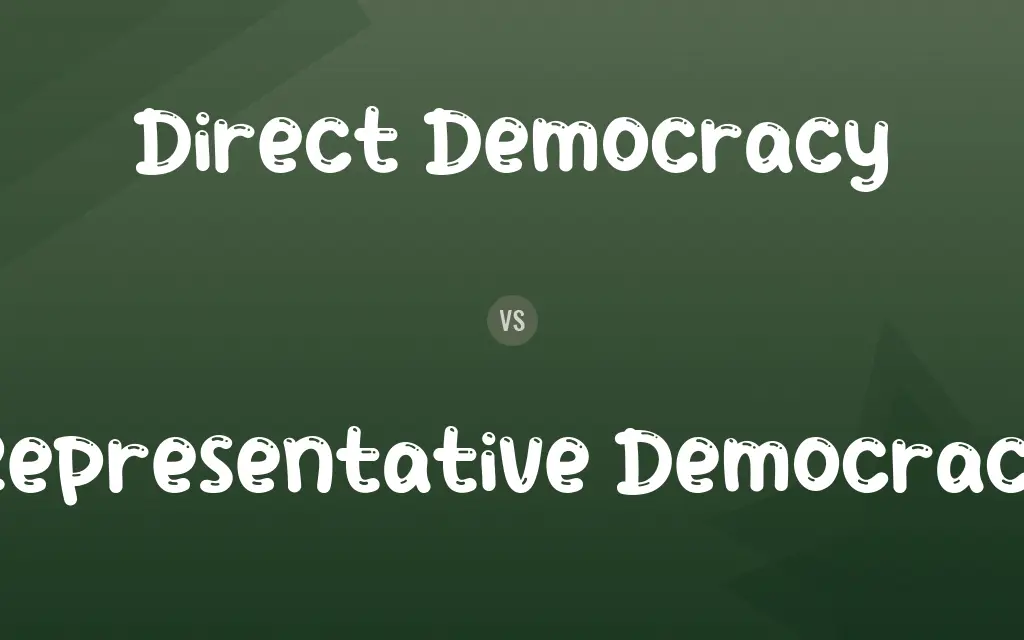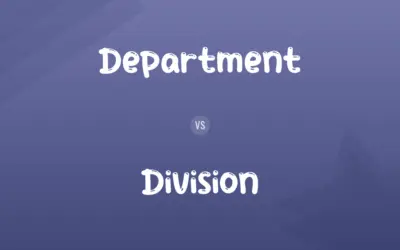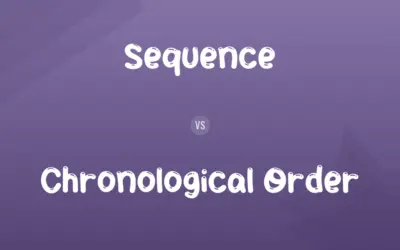Direct Democracy vs. Representative Democracy: Difference and Comparison
Edited by Muazma Batool — By Muneeza Rehman — Published on April 17, 2024
Direct democracy involves citizens voting on laws and policies directly, while in representative democracy, elected officials make decisions on behalf of the people.

Difference Between Direct Democracy and Representative Democracy
Direct democracy, a system where citizens have the direct power to decide on laws and policies without intermediary representatives, is exemplified by practices like referendums and initiatives. This form allows for a high degree of public participation in the legislative process, giving voters the power to influence legislation directly. Representative democracy, on the other hand, entrusts elected officials with the responsibility to make decisions and govern on behalf of the electorate. This system is based on the election of public officials who represent the people's interests in legislative bodies.
Muneeza Rehman
Apr 17, 2024
One of the main advantages of direct democracy is that it can lead to high levels of citizen engagement and participation in the political process, as people have a direct say in governmental decisions. However, it can be challenging to implement on a large scale due to the complexity of modern societies and the extensive range of issues that require decision-making. Representative democracy, while potentially less engaging for the individual voter on a day-to-day basis, is more practical for governing larger populations. It allows for a more manageable form of decision-making, where elected representatives can dedicate their time to understanding and deliberating on complex issues.
Muneeza Rehman
Apr 17, 2024
Direct democracy is often seen in smaller communities or units within states where it is easier to gather the populace for decisions. In contrast, representative democracy is the prevalent system in most modern nations, where the logistics of having everyone vote on every issue would be unmanageable. While direct democracy offers the promise of greater control over laws and policies, it also requires a well-informed electorate to function effectively.
Muneeza Rehman
Apr 17, 2024
In terms of accountability, direct democracy places the responsibility for decisions directly on the citizens. Representative democracy, meanwhile, provides a mechanism for accountability through regular elections, where representatives can be rewarded or penalized for their performance in office. This setup also allows for a division of labor, with representatives focusing on governance while citizens can concentrate on other aspects of their lives.
Muneeza Rehman
Apr 17, 2024
Both direct and representative democracies have their merits and challenges. Direct democracy fosters direct participation and immediate accountability but can be unwieldy and demanding on voters. Representative democracy streamlines governance and is scalable for large populations but can lead to feelings of disconnect between the electorate and their representatives. The choice between the two systems or a blend thereof depends on various factors, including the size of the population, the level of political engagement among citizens, and the specific traditions and values of the society.
Nolan
Apr 17, 2024
Direct Democracy vs. Representative Democracy Comparison Chart
Decision-making
By citizens directly on laws and policies.
By elected officials on behalf of the people.
Muneeza Rehman
Apr 17, 2024
Participation
High level of citizen engagement.
Participation through voting for representatives.
Muneeza Rehman
Apr 17, 2024
Scalability
Challenging in large populations.
More practical for larger communities.
Muneeza Rehman
Apr 17, 2024
Accountability
Directly to the electorate.
Through elected representatives and regular elections.
Muneeza Rehman
Apr 17, 2024
Implementation
Suitable for smaller communities or specific issues.
Common in most modern nations.
William
Apr 17, 2024
Citizen Responsibility
Requires a well-informed electorate.
Requires selecting representatives who reflect voter interests.
Muneeza Rehman
Apr 17, 2024
Practicality
Can be difficult for complex societies.
Facilitates decision-making on complex issues.
Jonathan
Apr 17, 2024
Governance Focus
Direct involvement in specific decisions.
Delegated decision-making to representatives.
William
Apr 17, 2024
Direct Democracy vs. Representative Democracy Definitions
◉Direct Democracy
Engagement and Participation.
Direct democracy mechanisms encourage active participation and political engagement among citizens.
Muneeza Rehman
Feb 21, 2024
◉Representative Democracy
Election of Officials.
Regular elections provide a mechanism for holding representatives accountable for their actions.
Muneeza Rehman
Feb 21, 2024
◉Direct Democracy
Immediate Impact.
In a direct democracy, citizens voting in a referendum directly decide on the matter at hand.
Muneeza Rehman
Feb 21, 2024
◉Representative Democracy
National Governance.
Representative democracy is suited to the governance of nations, where direct voting on all issues is impractical.
Nolan
Feb 21, 2024
◉Direct Democracy
Referendums and Initiatives.
Through initiatives, citizens can propose legislation directly, bypassing the traditional legislative process.
Levi
Feb 21, 2024
◉Representative Democracy
Delegated Authority.
In representative democracy, citizens elect officials to make laws and policy decisions on their behalf.
Muneeza Rehman
Feb 21, 2024
◉Direct Democracy
Informed Electorate.
Effective direct democracy relies heavily on citizens being well-informed about the issues they vote on.
Muneeza Rehman
Feb 21, 2024
◉Representative Democracy
Legislative Deliberation.
Elected representatives spend time understanding and debating laws, representing the electorate's diverse views.
Muneeza Rehman
Feb 21, 2024
◉Direct Democracy
Community Decisions.
Local communities may use direct democracy to decide on community-specific issues, such as school funding.
Elijah
Feb 21, 2024
◉Representative Democracy
Political Parties.
Political parties play a significant role in representative democracies, organizing around shared ideologies to represent voter interests.
Jonathan
Feb 21, 2024
Direct Democracy vs. Representative Democracy Frequently Asked Questions
What challenges does direct democracy face in large countries?
The logistical challenges of gathering votes and ensuring an informed electorate make it difficult to implement on a large scale.
Leo
Apr 17, 2024
How does representative democracy ensure accountability?
Through regular elections, where citizens can vote out representatives who do not act in their interest, ensuring accountability.
Muneeza Rehman
Apr 17, 2024
Can a country have both direct and representative democracy elements?
Yes, many countries incorporate elements of both, using direct democracy for referendums alongside a representative legislative system.
Muneeza Rehman
Apr 17, 2024
How does representative democracy address complex issues?
It allows elected experts to dedicate time to understand and deliberate on complex matters, making informed decisions.
Muneeza Rehman
Apr 17, 2024
Is one form of democracy better than the other?
Each form has its advantages and is suited to different contexts; the best system often incorporates elements of both to balance engagement with practical governance.
Muneeza Rehman
Apr 17, 2024
How do citizens participate in a representative democracy?
Besides voting in elections, citizens can participate by engaging with their representatives, participating in party politics, and contributing to public discourse.
Elijah
Apr 17, 2024
What role do referendums play in representative democracies?
Referendums can be used to directly involve the electorate in decision-making on specific issues, blending elements of direct democracy within a representative framework.
Leo
Apr 17, 2024
Can direct democracy lead to populism?
While it encourages participation, direct democracy can sometimes lead to populism if decisions are made based on popular appeal rather than informed debate.
Olivia
Apr 17, 2024
What is a key benefit of direct democracy?
A key benefit is that it allows citizens to have a direct impact on laws and policies, enhancing engagement and accountability.
Muneeza Rehman
Apr 17, 2024
How do modern technologies impact direct democracy?
Technologies like the internet can facilitate information sharing and voting processes, potentially making direct democracy more feasible on a larger scale.
Kaitlyn
Apr 17, 2024
Content Creators
Written by
Muneeza RehmanAt Comparisons.wiki, Muneeza skillfully navigates the vast sea of information, ensuring clarity and accuracy as the lead content editor. With a keen eye for detail, she curates every comparison to enlighten and engage readers.
Edited by
Muazma BatoolAs a content editor, Muazma Batool is not just a grammar guru but a creative mastermind who breathes life into every word. With an eagle eye for detail and a passion for storytelling, she transforms bland text into engaging content that captivates audiences and drives results.

































